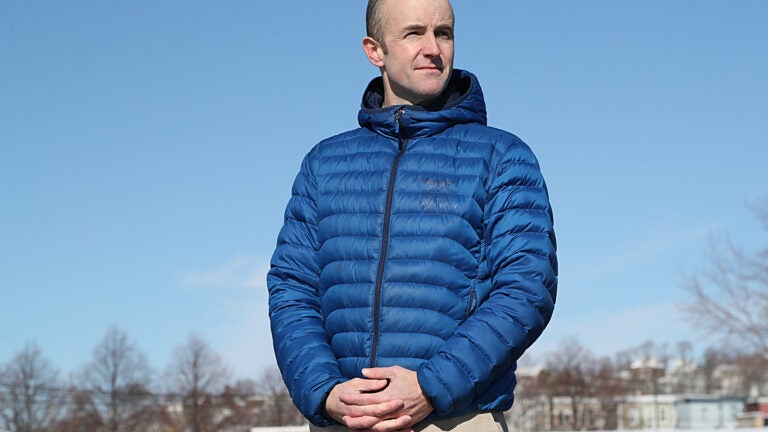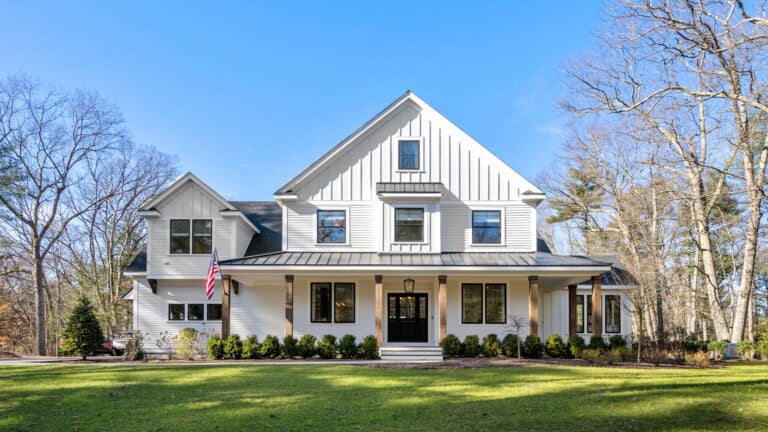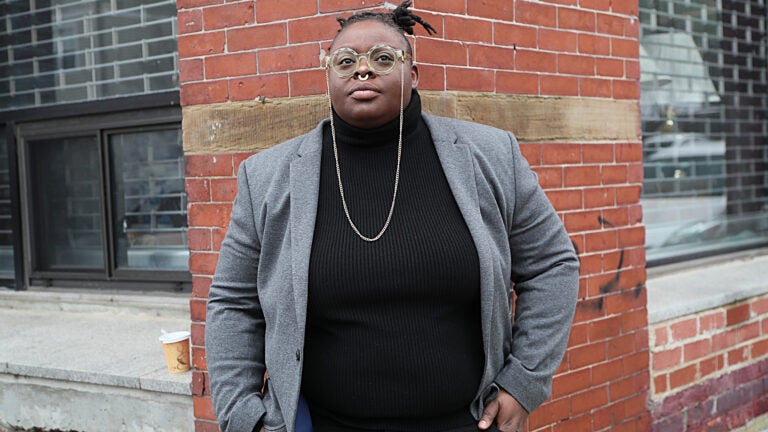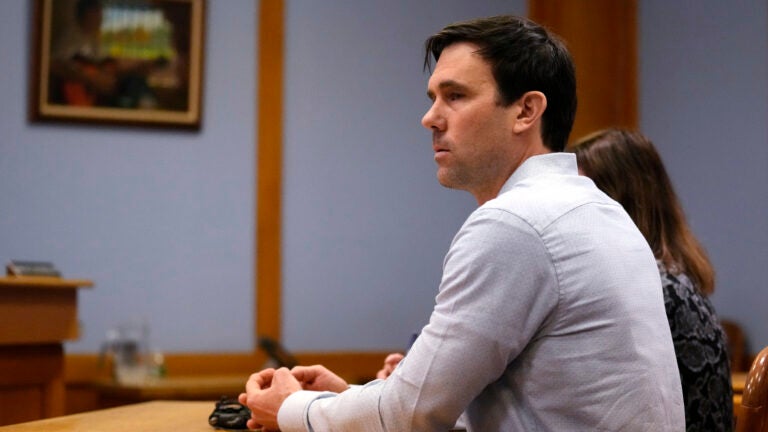Massachusetts just passed a landmark climate bill. Here’s why Ben Downing thinks it doesn’t go far enough.
The Democratic gubernatorial candidate is running on clean energy, and he thinks lawmakers should be clearer about both its benefits and the costs of inaction.

Ben Downing knows conversations about addressing climate change can at times be dense and, in his words, “really dour.” But for Massachusetts, he argues the topic should be exciting.
“I’m more hopeful and optimistic about this than I ever have been before,” says the Democratic gubernatorial candidate and former state senator.
As the first and, so far, only person to officially declare their candidacy in the 2022 governor’s race, Downing released a climate plan last week, a centerpiece of his campaign, that aims to push further than the bipartisan climate legislation Republican Gov. Charlie Baker signed into law less than two weeks earlier to achieve “net zero” emissions by 2050.
In comparison, Downing’s plan calls for meeting 100 percent of the state’s electricity demand with clean energy by 2030, followed by moving to 100 percent clean energy across all sectors by 2040. The ambitious proposal would also put clean energy procurement power in the hands of state government, rather than utilities, and earmark half of all state climate spending for newly designated environmental justice communities.
For years, Downing says the Massachusetts state government has approached climate with “sluggishness and delay.” And while the 39-year-old East Boston resident says there is “understandably” a lot of focus on the “costs and the challenges of making the transition to a clean energy economy,” he also says it’s important to make the benefits — as well as the costs of inaction — “tangible and real.”
Downing recently spoke with Boston.com about his new climate plan and the broader shift toward a clean energy economy. The transcript of the interview has been lightly edited for clarity.
Gov. Baker just signed a bipartisan, and pretty sweeping, climate bill into law. Why do you think it isn’t enough?
So, if you look at the leading states in the nation, those who are really trying to develop comprehensive plans that are in line with climate science, 12 to 15 of them, depending on how you measure it, have 100 percent clean energy or clean electricity goals, either in law or an executive order right now. And in all of those cases, they have had a comprehensive, whole-of-government approach to meeting the climate crisis.
I think the legislation that was passed and was signed into law, even over Gov. Baker’s objections, was important. In many ways, it outlines the critical components and steps that we need to take. But the outline, while necessary, isn’t sufficient. And what I tried to do with the climate plan that we rolled out was start to show the way forward to not just hit the goals that are in that legislation, but to exceed them. And to do so with the urgency that climate requires.
What does it mean to have 100 percent clean electricity by 2030 and 100 percent clean energy by 2040, compared to the state’s current goal of having net-zero emissions by 2050?
Under current law and in Gov. Baker’s own plans, we could have fossil fuel infrastructure operating and in place in 2050 or beyond. There’s nothing that would bring it to a halt in any way. So there isn’t a commitment in place that gets to 100 percent clean electricity or clean energy. And quite frankly, based on the incentives for incumbent providers and stakeholders right now, I think we need to be explicitly clear that we are going to move to a 100 percent clean energy future.
I think that’s the only way you’re going to get the gas utilities to change their business model. That’s the only way you’re going to get the electric utilities to think about how they bring on more clean energy and how they get it to communities that have been overlooked for too long. You need that forcing function, and I think, for too many of them, they see net-zero as having enough of an escape valve that they’re going to be able to continue with business as usual. And business as usual just isn’t good enough.
The Boston Globe just had a story last week about how following through on the new law’s goals, as they stand now, is already going to be difficult, given the investments that utility companies have made in fossil fuel infrastructure. How do you incentivize them to completely overhaul their model without there being downstream effects on energy prices?
I think it’s worth restating the experience that Massachusetts has had for the last 15 to 20 years, and every single time we’ve set a new and ambitious goal when it comes to climate and clean energy, we have hit that goal. We have hit it ahead of time. And have done so with far greater benefits and far lower costs than were assumed at the beginning of the process. This is true of solar goals, it’s true of offshore wind goals, it’s been true of energy efficiency and conservation goals. It is absolutely important to figure out how we get there, and to do so in the most cost-effective way possible. But it’s also important to remember what the experience has been going back to the Green Communities Act and the Global Warming Solutions Act becoming law.
If you look just over the border from us in New York, New York has a proceeding called the REV proceeding, which is a horribly named acronym; it’s Reforming the Energy Vision. But what they’re doing in New York is completely restructuring the utility rate-making process, which is even — like, I like this stuff and saying that makes me get tired and roll my eyes. But that’s the work that allows renewable energy to come online more quickly. It is the work that allows distributed renewables to be the alternative, instead of a substation in a flood zone in East Boston.
So I think you need to take a comprehensive view. I think you need to be explicitly clear about where we are going. And then you need to recognize that there will be multiple levers that need to be pulled to actually hit these goals. That’s everything from offshore wind RFPs to increasing the renewable portfolio standard and clean energy standard to a massive deployment of energy storage above and beyond where we’ve been today.
Why is it that Massachusetts has reached those goals?
I think it’s because the solutions are out there. I think more traditional capital and financial providers are comfortable with the investments in renewables than they were five, 10, 15, 20 years ago. Every next iteration there’s greater comfort, and you see more capital coming to that, and being willing to make those investments. And so you now have several, several iterations of renewable energy programs in Massachusetts that folks know have the potential to be a solid, if not spectacular, investment for years to come. I think the biggest part of it is policymakers maybe not appreciating enough the power of the solutions that are out there, and the appetite for solutions to climate.
In the last four years doing the work that I did, I was blown away time and time again at how quickly battery costs are coming down, how quickly panel costs and other sort of optimizations of solar projects were coming along. And I know that’s just one slice of the overall market, and I know that’s true on offshore wind. No one expected the significant declines in cost between Cape Wind and the next generation of projects and every further generation on from it.
I just think there’s a bit of a bit of hesitancy, understandably, from policymakers. But I think there is an unlimited potential to tap into to help build this future.
The state recently entered into the Transportation and Climate Initiative to reduce emissions in the transportation sector. Do you think that’s enough?
I think TCI is good; it’s certainly not enough. And I think this gets to the more comprehensive view that you need from a governor. To, on the one hand, be bringing together a regional pact around TCI and, on the other hand, cutting funding for transit‚ not just at the MBTA but at all of the transit agencies — to me is counterproductive. It’s important that TCI be successful. It’s just as important that public transit be a safe and reliable option for everyone and that we are expanding transit, not cutting back on transit.
Similarly, the pilot project program work that’s been done around electric vehicles is important, but to invest in EVs while cutting back transit makes no sense at all. There’s certainly been progress in some areas, but the sort of the fragmented approach has held us back from starting to reduce those overall emissions more.
You can fund public transit but another difficult part is getting people to make that shift from cars to transit and addressing the psychological and financial incentives that can kind of cut against that. What would be the strategy to induce more widespread adoption? I know there’s talk about trying to reduce fares or doing some sort of congestion pricing. What are your thoughts on that?
I think all of those options should be on the table. Congestion pricing, we should have studied, it should be implemented already, and I think it’s a powerful tool for changing behavior.
I do think the movement away from funding public transit through fares and funding it through taxes gets it right on policy. We have funded transit through a fare-based system because they’re used to be private providers at the turn of the 20th century. So that’ll be part of our transit proposal when we roll that out in a similar plan to the climate plan.
You see the daily images, these days, first of congestion starting to come back to Boston and, second, of MBTA and other RTA services, but in particular MBTA services, where trains and buses are absolutely packed. It doesn’t do a lot to inspire confidence and to answer questions for people who are trying to figure out if that is a safe alternative to come back to at this point. And I think there needs to be a significant campaign from the administration, from the MBTA, to promote the use of transit. And again, they are hampered doing that when the budget priority has been to cut those services, and only restore them when the congressional delegation was rather explicit about it.
I also think we need to do things to encourage private providers to not subsidize parking spots but to be providing greater incentives for folks to walk, to take the bike, to use transit wherever and whenever that’s possible. It has to be a comprehensive approach where state government is using every lever it has to promote the use of transit, to promote the use of non-emitting modes of transportation.
What would be the route for using more taxes to fund some of these initiatives?
We will be rolling out — and I’m not trying to use this as a cop out — we’re gonna have a comprehensive tax reform plan as one of the dozen or so plans that we roll out. Certainly, I support the Fair Share amendment, but I don’t think it would be responsible to run for office and presume that’s going to be the law. I think it’s important to put forward the plan that will fund the proposals that we support. The broad strokes are trying to shift a greater portion of the overall tax burden to those that have benefited from economic growth over, even in this period over the last year, but in particular, over the better part of last few decades. We’ve seen that the bottom 20 percent of earners in Massachusetts pay a far greater share of their income in taxes than the top 10 percent. And that gets exponentially worse the higher up the income ladder you go.
You mentioned having electric vehicle incentives. Is that increasing rebates? Or what sort of incentives do you think we should be providing to get people to buy more electric cars?
Rebates are going to be the upfront tool. I think the other thing state government can be doing is just making it a simpler process for shopping. I know there’s been partnerships with some nonprofits to do consumer education. I think we absolutely need to do a far better job of laying out the information around where different charging stations are, so that folks don’t feel like they are going to be perpetually hunting to fill up their electric vehicle.
So I think there’s a lot that the state government can do to just address the unknowns. On the incentives, we’ve actually been pretty good. What we haven’t been as good about is being intentional about promoting those incentives, about getting out into communities where there is interest and mapping out the resources to make it really simple and easy for people to make the transition. The last thing you need to do is to make adoption of a new technology cumbersome and confusing. And I think, to date, that’s what we’ve done.
You’ve said that climate is perhaps the central reason that you’re running for governor, and I know there’s a lot energy around the subject. But I also remember covering the presidential campaign last year and how Washington Gov. Jay Inslee similarly came out as the quote-unquote climate candidate, and then sort of fell flat. It’s also a very complicated issue, so I was curious how you make that an appealing and mobilizing issue for voters.
I think there’s a variety of different ways. I say I think there is; I hope there is. I hope there’s a variety of different ways to do it. First, in starting with clear, concrete, as tangible as things can be, when it comes to climate goals, is an important part of that. We’ve got that in place with the plan that we rolled out.
And then I think being clear about the benefits. We rightly and understandably talk a lot about the costs and the challenges of making the transition to a clean energy economy. We certainly don’t talk enough about the benefits and the potential positive outcomes of making the transition. I think we actually have a great story to tell here in Massachusetts, and that is about the broader clean energy economy, the benefits that it has meant for ratepayers, for folks that are signed up on clean energy projects across the state, for electricians, for electrical contractors, for unions, for cities and towns that have used projects to get significant tax revenue at times of economic downturn.
Telling a much clearer story about the positives of it. And knowing full well that we don’t even know all the positives. Part of the plan I’m really excited about is the increased investment in the Mass. Clean Energy Center to try to capture more of those early-stage companies that are thinking about the next round of energy storage, the next version of geothermal, a lot of the work that’s going on at Greentown Labs and other places like it.
There are plenty of people who don’t care about climate but are sick and tired of sitting in traffic, and if there’s better more reliable transit that frees up the roads a little bit, take some of the pressure off of that existing infrastructure, it can be a quality of life issue. If we’re building more housing near transit hubs, then you’ve got a more walkable community. That’s a climate issue. So I think, trying to find ways to make it tangible and real for people, and also to make the cost of inaction tangible and real.
Three to four months after I was elected, I was sitting in a middle school gym after three paper plants in the southern Berkshires had closed. No one thought paper was the future of the Berkshires economy, but those are mills that had operated for generations, and sitting across the gym and meeting with folks who had abruptly lost their jobs because of an electric rate spike, I couldn’t help but think we were there because policymakers, for decades, hadn’t recognized that climate was coming and that we’re at the end of an energy pipeline in New England, and we needed to do a far better job of controlling our future and controlling our future in line with our climate priorities and goals. I’ve lived and seen the impacts of our policy, putting us at the end of a natural gas pipeline and being reliant on that. And I don’t want to sit in that room again — not for me, but for all of those families. I don’t want them to go through that.
Get Boston.com's browser alerts:
Enable breaking news notifications straight to your internet browser.








Conversation
This discussion has ended. Please join elsewhere on Boston.com